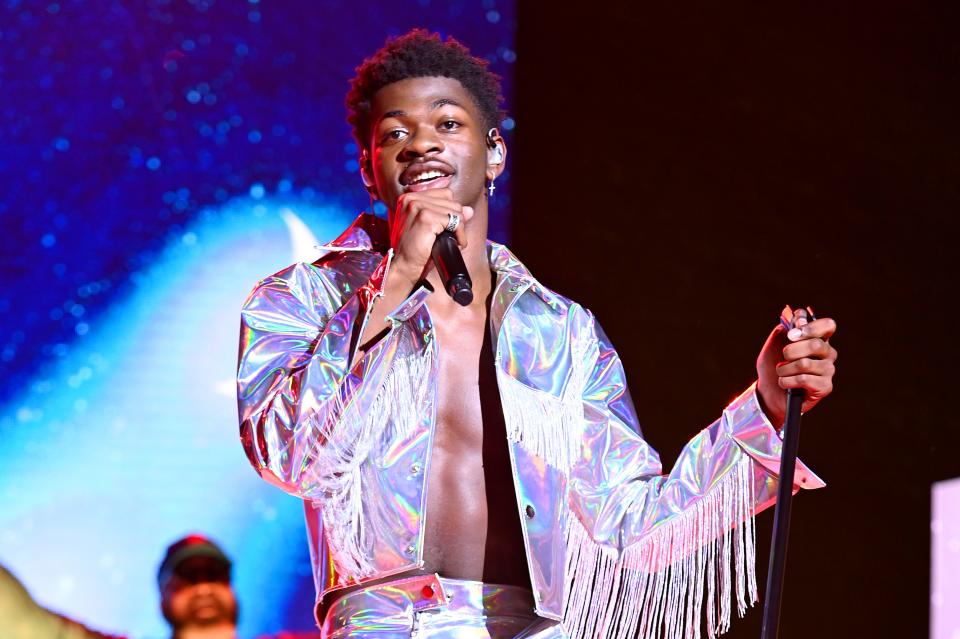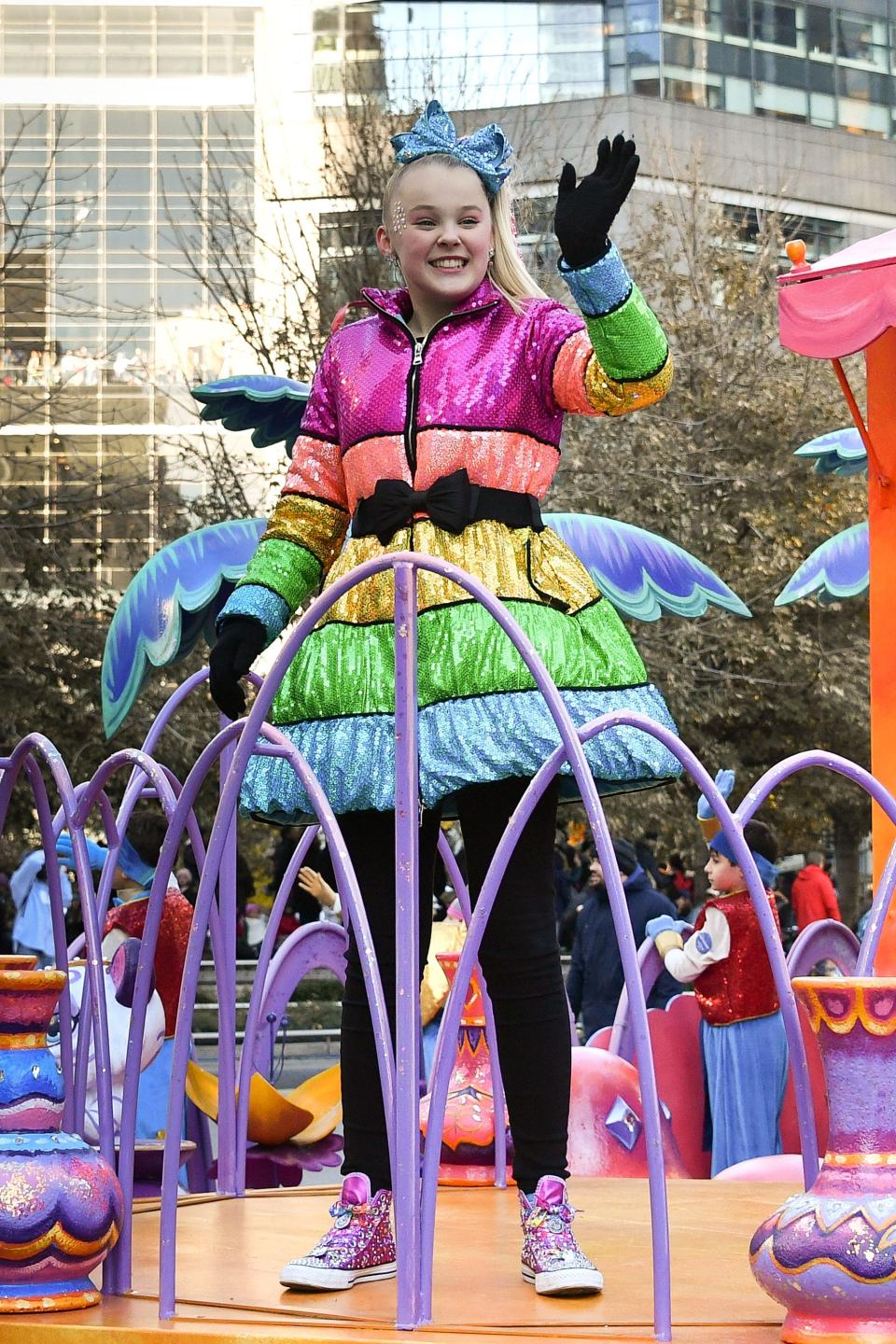How Lil Nas X, JoJo Siwa and Zaya Wade are teaching kids to be more inclusive
- Oops!Something went wrong.Please try again later.
- Oops!Something went wrong.Please try again later.
- Oops!Something went wrong.Please try again later.
Zaya Wade, the transgender daughter of Dwyane Wade, has soared in popularity on social media and even interviewed former first lady Michelle Obama. JoJo Siwa recently revealed she has a girlfriend and identifies as pansexual and queer. And Lil Nas X celebrated Black queerness with his song and accompanying video for "Montero (Call Me By Your Name)" last month.
These famous members of Generation Z are teaching the next generation about diversity and inclusion the only way they know how: by being their out and proud selves. And experts say their example can help children and teenagers embrace who they are, as well as encourage adults to foster an environment that promotes acceptance.
"Having out Black queer and trans celebrities like (Lil Nas X) and (Wade) in the social media age is really crucial for modeling Black queer and trans self-determination for young people," says Ed Brockenbrough, an associate professor at University of Pennsylvania's Graduate School of Education. "We can have panel discussions and articles and books, but to have young people who are taking center stage in the realms that other young people are really sort of using to explore their identity is crucial."

In case you missed: Lil Nas X's Satan imagery angers parents. But advocates say critics are missing the point.
It's 'not too early' to talk to kids about LGBTQ issues
Education about inclusivity starts at home and in the classroom, even as early as elementary school.
"The needs with elementary teachers often revolve around helping those teachers understand that elementary-age children are developing their sexualities and their gender identities," says Brockenbrough, whose research focuses on the educational experiences of queer youth of color. "It's actually not too early to talk to first graders about these issues, but we just have to find age-appropriate language."
Many schools lack LGBTQ-inclusive curriculum, according to GLSEN's 2019 National School Climate Survey; only 19.4% of respondents indicated positive representations of LGBTQ people, history or event were taught at their schools.
Bullying often ramps up in middle and high school. A co-chair for the Philadelphia chapter of GLSEN, Brockenbrough trains teachers on how to interrupt harassment and what language to use.
To check out: 'All Boys Aren't Blue,' 'Unapologetic': The 4 best LGBTQ films we watched at Outfest Fusion 2021
Brockenbrough suggests elementary schools to focus on acceptance when teaching children about LGBTQ people and families. – an approach that respects where children are developmentally and isn't controversial. Many parents of elementary school kids balk at getting too specific in terms of LGBTQ identity, he says.
But kids may be having internal thoughts about identity from a very young age as was the case for Zaya Wade, 13, whose father Dwyane Wade has said she knew her gender identity at age 3.
The former professional basketball player opened up about his daughter's transgender identity in February 2020, and he also shared how he and wife Gabrielle Union have supported Zaya in her journey.
"Gabrielle Union and Dwyane Wade were so supportive of Zaya coming out and really did a lot of work above and beyond just supporting her, but really making sure other people understood the importance of family support," says Shanna Katz Kattari, an assistant professor at the University of Michigan's School of Social Work and Department of Women and Gender Studies.
Wow: Michelle Obama praises Dwyane Wade's daughter Zaya for 'embracing your truth'
The rhetoric around coming out used to be that horrible things would happen, like you'd lose your family or only a few people would support you, Katz Kattari says. It can be scary for a non-celebrity to see a celebrity come out and see some of their worst fears play out. Think back to Caitlyn Jenner coming out in 2015, and how many people misnamed her or used incorrect pronouns. (Jenner is now running for governor of California).
JoJo Siwa, whose primary audience is children, most recently changed the game by sending a message to her followers who aren't happy with who she is: "I don't want people to watch my videos or buy my merchandise if they aren't going to support not only me, but the LGBTQ community."
'Kid-friendly is a slippery term'
As for Lil Nas X, while some parents are happy about his sex positivity and how the star is evolving, others are concerned due to the "kid-friendly" image he embodied for his hit "Old Town Road."
"Kid-friendly is a slippery term," Brockenbrough says. Developmentally appropriate is a better way to put it, he says, adding just because Lil Nas X's subsequent song "Montero" was sexually explicit doesn't mean a conversation can't take place about queer indentities.
"Some kids just might not be ready for the explicit sexual content of a video like 'Montero,'" he says. "That's not an excuse to then not talk to children about LGBTQ issues, but there are ages at which young people are sort of more prepared to process messages about sexuality."
For all the ire the video received, praise for Lil swelled too – but Brockenbrough is concerned about the attacks Wade and Lil Nas X receive online. "I do worry that the positives of (visibility) are accompanied by the detrimental effects of the harassment that's targeted toward them as well."
Katz Kattari adds, however, we're seeing more and more people come out in these supportive spaces – and the more visibility, the more lives that could be saved.

"There are young people who feel so alone and so isolated, and then see someone like JoJo (Siwa) come out, see someone like Lil Nas X come out and it literally makes them feel like they are not alone, and it saves lives," Katz Kattari says. "And so whether you have feelings about somebody twerking up on Satan or not, knowing that that could save the life of your child or a child in your community, that to me makes this all beyond worth it."
For people who identify as LGBTQ, if you or someone you know is feeling hopeless or suicidal, you can also contact The Trevor Project's TrevorLifeline 24/7/365 at 1-866-488-7386.
The Trans Lifeline is a peer support service run by trans people, for trans and questioning callers.
This article originally appeared on USA TODAY: Lil Nas X, JoJo Siwa, Zaya Wade teach kids to be more inclusive

